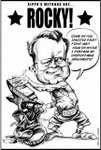But what is most telling here is the personal animosity that Pseudo holds towards me. My Lord and Savior taught that we were to love our enemies and do good to those that hate us. All Pseudopodeo wants to do is to insult and defame those of us who disagree with him. He has been taught in his strange little religion that Catholic are to be treated with contempt and that it is not necessary to treat us as human beings. To this end, Pseudo feels it is permissible to lie, insult, and misrepresent us Catholics. I find this very sad, and frankly it leads me to question his alleged commitment to Christ.
My challenge remains open. Anytime that Pseudopodeo wants to, he may open negotiations for an online debate. I am willing to put all of his derogatory remarks behind us and start fresh. It would be nice if Pseudopodeo would apologize to me for the lies he has told and for his animosity, but it is not necessary. We Christians are used to being roughly handled.
As St. Paul wrote:
1Cr 4:9
For I think that God has exhibited us apostles as last of all, like men sentenced to death; because we have become a spectacle to the world, to angels and to men.
1Cr 4:10
We are fools for Christ's sake, but you are wise in Christ. We are weak, but you are strong. You are held in honor, but we in disrepute.
1Cr 4:11
To the present hour we hunger and thirst, we are ill-clad and buffeted and homeless,
1Cr 4:12
and we labor, working with our own hands. When reviled, we bless; when persecuted, we endure;
1Cr 4:13
when slandered, we try to conciliate; we have become, and are now, as the refuse of the world, the offscouring of all things.
1Cr 4:14
I do not write this to make you ashamed, but to admonish you as my beloved children.
I take these words seriously. I expect that the enemies of Christ and His Church will do whatever they can to destroy the simple faith of us who have remained loyal to the Gospel revealed once and for all to the Saints and who have not been "tossed to and fro, and carried about with every wind of doctrine, by the deceit of men, and cunning craftiness, whereby they lie in wait to deceive" (Eph 4:14) as have the sad victims of the so-called 'reformation" apostasy.
My offer was made in good faith and it remains open. I forgive you, Pseudo, for anything you may have done to injure me. I ask your forgiveness for any sleight I might have made towards you. When you are ready to discuss the issues, I will be here waiting. I still pray for you at every Mass that God will convert your heart of stone to one of flesh and that you will join us who live gloriously in the reign of God.
Art Sippo MD, MPH



